Mulberry Fruit Drop: Reasons For A Mulberry Tree Dropping Fruit
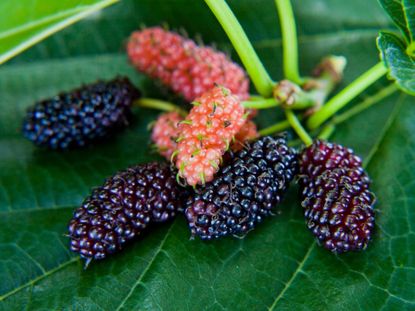

Mulberries are delicious berries akin to blackberries, which can be used in much the same way. Generally speaking, you will rarely find these delicacies at the local farmers' market let alone the supermarket, as they have a short shelf life. The best way to ensure a good supply is by planting your own mulberry tree, but keep in mind these heavy bearers are prone to heavy mulberry fruit drop and can create quite a mess.
Mulberry Tree Dropping Fruit
Unlike other fruit bearers, mulberry trees begin bearing at an early age and quite heavily at that. Soon enough, you will have entire buckets of berries, far more than the average family can eat. Not too worry. Fruit drop in mulberry trees is very common, hence the mention of a mess. Birds will get to them but probably not before they stain the drive or sidewalk or even the soles of your shoes to be tracked indoors. Like all fruit trees, premature fruit drop of mulberries may occur. This is generally due to several factors: weather, inadequate pollination, pests or disease, and overbearing.
What to do About Ripe Mulberry Fruit Drop
As mentioned, ripe fruit drop in mulberry tree cultivation goes with the territory. This is the nature of this particular berry tree. You can either just “go with it” or enjoy the plethora of fruit-loving birds the tree attracts, or you can lay a tarp beneath the tree during mulberry fruit drop season, which will make a tidy and rapid method for harvest. Going in forewarned, for those who have not yet planted a mulberry, choose a site that does not hang over your driveway or sidewalk because fruit drop in mulberry trees is a guarantee, not a possibility. - Of course, you can always choose to grow a fruitless mulberry tree too, or consider sterilization of the fruit tree.
How to Fix Premature Fruit Drop of Mulberries
For any fruiting tree, the number one reason for premature fruit drop is the weather. Given that you can't control the weather, you can take steps to protect the tree if inclement frost is forecast during the growing season. Cover the tree with sheets, burlap or the like, or string holiday lights around the tree to keep it warm. Wind can also take its toll and result in premature fruit drop. Be sure to stake young trees to prevent damage. Companion planting can boost pollination around your mulberry and lessen the chances that inadequate pollination results in premature fruit drop. Also, avoid using pest control sprays that may affect the pollinators during bloom times. Pests and diseases can be combated with a pesticide or fungicide if the infestation is serious. Keep in mind that the use of pesticides during blossoming may exacerbate premature fruit drop by killing bees and other beneficial insects. Lastly, premature fruit drop is often the result of overbearing, which is most common in young trees that have less stored nutrition than mature trees. If the tree is in competition between saving itself and fruiting, sending nutrients to produce berries, or survive itself, obviously the tree wins. Sometimes trees prematurely drop fruit due to the sheer weight of it on their branches. It is of paramount importance to thin the young fruit before the tree drops it. Use a small pruner and leave 4-6 inches (10 to 15 cm.) between fruit clusters. You can also pinch off blossoms before the petals drop. Follow all the above and barring unforeseen circumstances you should be enjoying an antioxidant, protein-packed smoothie for, well, the rest of the year given the proliferation of berries you're bound to harvest!
Gardening tips, videos, info and more delivered right to your inbox!
Sign up for the Gardening Know How newsletter today and receive a free download of our most popular eBook "How to Grow Delicious Tomatoes."

Amy Grant has been gardening for 30 years and writing for 15. A professional chef and caterer, Amy's area of expertise is culinary gardening.
-
 Urban Composting Guide: How To Compost In The Middle Of The City
Urban Composting Guide: How To Compost In The Middle Of The CityUrban composting does not have to be daunting. You can compost in the city, and maybe even try some urban worm composting!
By Mary Ellen Ellis
-
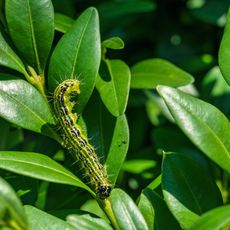 Shrub Diseases And Pests To Watch Out For
Shrub Diseases And Pests To Watch Out ForShrub diseases and pests can be challenging. Learn how to recognize and eradicate them before they can present a danger to your plants.
By Susan Albert
-
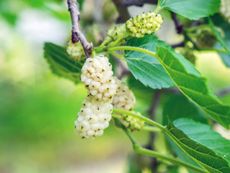 White Mulberry Info: Tips On Caring For White Mulberry Trees
White Mulberry Info: Tips On Caring For White Mulberry TreesIf you're not put off by their messy fruit, there are many types of mulberries to choose from for the landscape. This article will cover white mulberry trees, which may be fruiting or fruitless. Click here for more information on white mulberry care in the garden.
By Darcy Larum
-
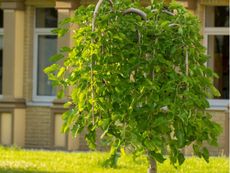 What Is A Weeping Mulberry: Learn About Weeping Mulberry Tree Care
What Is A Weeping Mulberry: Learn About Weeping Mulberry Tree CareThe weeping mulberry was once used to feed valuable silkworms, which love to munch on the leaves, but that is no longer the case. So what is a weeping mulberry? The following article contains information on planting and growing a weeping mulberry.
By Amy Grant
-
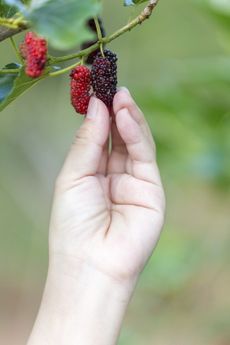 Mulberry Tree Harvest: Tips On How To Pick Mulberries
Mulberry Tree Harvest: Tips On How To Pick MulberriesIf you live in USDA zones 5-9, you can enjoy your very own mulberry tree harvest. The question is "When to pick mulberries?". This leads to a follow-up question about how to pick mulberries. Learn the answers to both questions in this article.
By Amy Grant
-
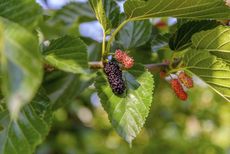 Dwarf Mulberry Tree Facts: How To Grow A Mulberry Tree In A Pot
Dwarf Mulberry Tree Facts: How To Grow A Mulberry Tree In A PotMulberries are easy to grow, abundant, and fast growing, which makes them perfect for containers. If you're interested in growing mulberries in containers, click this article to find out how to grow a mulberry tree in a pot and other dwarf mulberry tree facts.
By Amy Grant
-
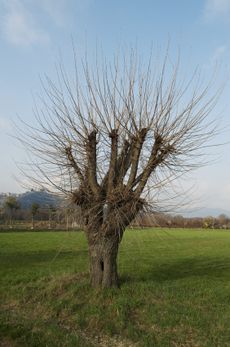 Mulberry Trimming – Learn When And How To Prune A Mulberry Tree
Mulberry Trimming – Learn When And How To Prune A Mulberry TreeMulberry trees can reach 30'-70' depending on the species. They are fantastic shade trees. Due to their quick growth, pruning mulberry trees is often necessary. The information found in this article can help get you started with mulberry trimming.
By Karen Boness
-
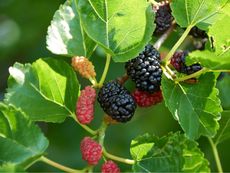 Mulberry Tree Care – Learn How To Grow Mulberry Trees
Mulberry Tree Care – Learn How To Grow Mulberry TreesInterested in learning about how to grow mulberry trees? This article will help get you started with mulberry tree care.
By Amy Grant
-
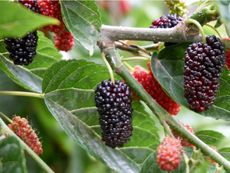 Mulberry Fruit Tree Sterilization: How To Stop A Mulberry From Fruiting
Mulberry Fruit Tree Sterilization: How To Stop A Mulberry From FruitingIf you have a mulberry that fruits, you may be well aware of the mess the fruit can create. Wondering how to stop a mulberry from fruiting, however, can be explained here.
By Amy Grant
-
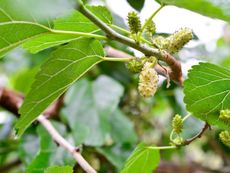 Corkscrew Mulberries: Care Of Contorted Mulberry Trees
Corkscrew Mulberries: Care Of Contorted Mulberry TreesOriginating in Japan, contorted mulberry trees (Morus alba) thrive in zones 5 through 9. This tree is also known as a contorted "Unryu" mulberry and you can learn more about it in this article.
By Susan Patterson